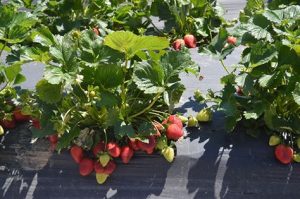
Bill Landreth, owner of Berries by Bill, delivers fresh seasonal fruit to a local school in Newport, Arkansas as part of the Farm to School program.
By Jason Floriani, Arkansas FSA Farm Loan Officer
Bill Landreth, owner of Berries by Bill, Inc., has a u-pick strawberry patch and grows a variety of fresh produce sold on his farm and at local farmer’s markets. He can also be found making deliveries of his seasonal fruits to local schools in Arkansas.
Landreth said this is a “win-win” for him and the students. He is able to reduce waste by moving more of his product, while the students obtain nutritional, locally-grown, fresh fruit that might not always be available to them outside of school. Since strawberries are normally harvested from early April through the end of May, his strawberries add variety to the school menu before school is out for summer.
Child Nutrition Director for Harrisburg Public Schools, Dolores Sutterfield, said the Farm to School program has been a big success. Initially she had some hesitation with the extra labor that might be needed by her staff in preparing the fresh produce for serving. But after the first day of serving the fresh produce in their school, she received a message saying the new foods were a resounding hit and the students preferred the new, fresher options.
Sutterfield said that the students enjoyed the change in their lunch and her staff takes great pride in making fresh lunches for students with products from their local farmers.
The Farm to School program enriches the connection communities have between fresh healthy food and local food producers, said Landreth. And, that sentiment has been echoed nationwide.
The connection between local farmers and schools is taking place in over 42,000 schools across the country, with 195 schools participating in Arkansas, according to the 2015 USDA Farm to School Census. Schools purchased nearly $790 million in local food from farmers, ranchers, fisherman, food processors and manufacturers during the 2013-2014 school year.
Landreth worked with the USDA’s Farm Service Agency (FSA) to help finance the equipment used to produce his strawberries. The Farm Service Agency addresses the credit needs of producers through direct and guaranteed loans. FSA’s Microloan program provides small, new, niche and nontraditional farmers with access to loans of $50,000 or less.

Landreth got his start by financing equipment with the Farm Service Agency and has expanded his deliveries to 10 local schools.
Landreth’s participation in Arkansas’s Farm to School program, providing locally-grown strawberries to the schools in Newport, began in 2015. He expanded his participation in the program in 2016 and is now providing strawberries to 10 different schools with hopes of expanding.
For more information on FSA’s farm loan programs, visit your local county FSA office or www.fsa.usda.gov. Locate your local office at offices.usda.gov. To learn more about the Farm to School program, visit the USDA Food and Nutrition Service website at www.fns.usda.gov.





